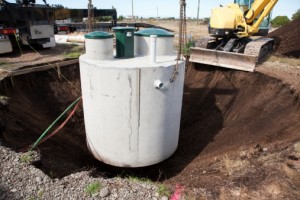Prevent costly septic system repair or replacement by following these tips for septic system care.
 If you’re living in one of the one-quarter of American homes connected to a septic system, you might rejoice to be free of city sewer fees. However, you probably won’t be so pleased when you have to cover the costs of your own sewage-related repairs. Fortunately, there are some concrete steps you can take to help keep a well-designed septic system working well for decades.
If you’re living in one of the one-quarter of American homes connected to a septic system, you might rejoice to be free of city sewer fees. However, you probably won’t be so pleased when you have to cover the costs of your own sewage-related repairs. Fortunately, there are some concrete steps you can take to help keep a well-designed septic system working well for decades.
Get Regular Inspections & Pumpouts
First and foremost, it is crucial that you get professional septic tank inspections and pumpouts on a regular basis. The EPA recommends getting an inspection every 3 years and a pumpout every 3 to 5 years. However, because different households fill their septic tanks at different rates, your needs may be different. If you have a big family and a small septic tank, it might be wise to invest in more frequent inspections. The inspector will let you know if levels of scum and sludge have risen to the point where a pumpout is needed. The inspector will also look carefully for any leaks or other issues that need to be addressed to prevent future problems.
Keep an Eye on Your Water Usage
The higher the volume of water that enters your septic system, the greater the risk of a problem. The EPA recommends conserving water as an important component of caring for your septic system. You might consider installing high efficiency plumbing fixtures and appliances, and you should also be sure to repair any drippy plumbing quickly. Avoiding swamping the septic tank with water by doing more than one high volume activity at once (like taking a shower and running the washing machine) can also help protect your septic system from problems.
Don’t Flush the Unflushable
Items that are not safe to put in your septic tank fall into two categories: cloggers and killers. Cloggers would be things like paper towels, baby wipes, cat litter, and food debris from the garbage disposal. These can cause very unpleasant and unsanitary issues such as a sewage backup in your home or yard. Killers would be chemicals like gasoline, antifreeze, pesticides, etc. that kill off the bacteria inside the septic tank that normally help break down solid waste. By keeping chemicals out of the septic tank, you can help go longer between pumpouts.
Take Care of Your Drainfield
Finally, be sure to take care of the drainfield attached to your septic tank. Don’t plant anything with deep roots over it as these could damage the network of pipes. Also, avoid parking or driving vehicles over the drainfield as this could compress the soil. One final tip is to make sure any water from gutters, sump pumps, or drainage in the yard is directed away from the drainfield to avoid flooding that could interfere with normal operation of the septic system.








